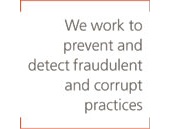 Abengoa
Abengoa
Annual Report 2012
- Corporate Social Responsibility
- Corporate governance, transparency and rigor in management
- Transparency and anti-corruption
Abengoa upholds an unwavering commitment to transparency in all of the activities and processes in which it engages, and holds transparency as the cornerstone underpinning the company’s relationship with its stakeholders.
Practices for preventing corruption
Abengoa has mechanisms and procedures in place to prevent and detect fraudulent and corrupt practices. All company employees periodically receive information on procedures to follow and channels for reporting any irregular activities.

Anti-corruption act
In the fight against bad practices such as extortion, fraud and bribery, Abengoa, while observing its own Code of Conduct, also adheres to the provisions of the U.S. Foreign Corrupt Practices Act (FCPA), in addition to the requirements established under Section 404 of the U.S. Sarbanes-Oxley (SOX) Act, which regulates the actions of all international companies that conduct any type of activity in the U.S.
The U.S. Department of Justice is ultimately responsible for compliance with the anti-bribery act by national and foreign companies, with the Securities and Exchange Commission (SEC) in charge of the application of regulations to listed companies.
In 2012, 279 financial audit reports were conducted, which included, among other aspects, reviews and analyses of corruption-related risks in companies determined as being material. A total of 29 legal audits were also performed.
There were no incidents of corruption detected over the course of the year, no incidents occurred in relation to monopoly practices or breaches of free competition, and there is no report of any fines or sanctions resulting from failure to comply with laws or regulations.
The Abengoa Code of Conduct
The Code of Conduct governs working relations within the company and between the company and its stakeholders. In the interest of promoting transparency and rigor in operating the company, the code is available for consultation through the company intranet, available to employees, as well as on the Abengoa website (www.abengoa.com). Furthermore, any changes made to the code are duly communicated throughout the organization immediately and with no exceptions.
No significant investment agreements have been made that include clauses incorporating human rights concerns or which have undergone human rights screening.
Whistleblower channels
Implemented in 2007, Abengoa’s whistleblower mechanism is managed in accordance with the requirements of the Sarbanes-Oxley Act and all related activity is reported to the Audit Committee.
The company has two whistleblower channels whereby the company’s stakeholders may report irregular conduct:
- Internal: Available to all employees, allowing them to report any complaints or claims concerning the financial statements or other reports, accounting matters, internal controls over the financial information reported, auditing matters or breaches of the Abengoa Code of Conduct.
- External: Intended to enable anyone outside the company to report irregularities, fraudulent acts or conduct that contravenes the Abengoa Code of Conduct. This channel is available on the Abengoa website.
Claims may be submitted with the petition of assurance of whistleblower confidentiality, and may also be sent in anonymously.
Abengoa’s aim in creating these channels is to provide a specific means of communication with company management and governing bodies, serving as an instrument for reporting any possible irregularity, non-compliance or conduct that runs contrary to the ethics, legality and norms governing the company.
In 2012, the whistleblower channels recorded infringements of the code of conduct and cases involving irregular employee behavior. All information and communications received were handled in accordance with the internal procedures established for this purpose and have been resolved satisfactorily.
Audits for preventing and detecting fraudulent activities
A specific unit was set up within the internal audit department in 2012
with the mission of conducting anti-fraud audits. The aim is to better control fraud within Abengoa. This unit is also responsible for investigating the information received through the whistleblower channel.
The anti-fraud audits are a significant improvement on previous years, in that they are conducted according to a plan of action which includes geographical locations or business segments that are most susceptible to fraud, and include a review of areas exposed to greater risk relating to financial statements.
This team also assesses critical projects by analytically reviewing financial information and analyzing other latent risks. It is also in charge of conducting inquiries after receiving any claim through the Abengoa whistleblower channel.
The anti-fraud audit plan includes approximately 50 activities per year, although program scheduling is flexible in order to adapt to any needs or new risks arising over the course of the year.
Conflicts of interest
Abengoa participates in scientific, technological and cultural events of interest to the company in the areas, cities and regions where the company conducts its business.
Furthermore, any activity that could be treated as lobbying is handled through the support of the different professional associations operating in each of sectors of activity of Abengoa’s business units. In the U.S., for example, Abengoa performs lobbying activities through some of the following professional associations: Cornerstone Government Affairs, Renewable Fuels Association, Association of Nebraska Ethanol Producers, Association of Missouri Ethanol Producers, and the Kansas Association of Ethanol Producers, CSP Alliance, Solar electric power association (SEPA) and Solar energy industries association (SEIA).
In 2012, no financial or in-kind contributions were made to any political parties or related institutions.

© 2012 Abengoa. All rights reserved
